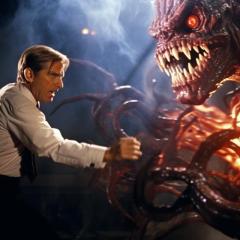-
Posts
2,412 -
Joined
-
Last visited
-
Days Won
20
Reputation Activity
-
 Loert reacted to Jurassic Shark in Indiana Jones and the Temple of Doom appreciation thread (film & score)
Loert reacted to Jurassic Shark in Indiana Jones and the Temple of Doom appreciation thread (film & score)
If you want scary, visit the DoD disenchantment thread.
-
 Loert reacted to geom_00 in Favorite short musical moments in Williams scores?
Loert reacted to geom_00 in Favorite short musical moments in Williams scores?
I haven't gotten to read all of this topic, but something for me, the answer is complicated.
I'm not sure WHY I like this so much, but to me it just is a beautiful snippet of music. In Hymn to the fallen, this small snippet flutters away, but it is beautiful.
-
 Loert reacted to JNHFan2000 in John Williams on Variety Cover (article & video)
Loert reacted to JNHFan2000 in John Williams on Variety Cover (article & video)
https://variety.com/2024/film/news/john-williams-oscars-star-wars-steven-spielberg-collaborations-1235929403/
-
 Loert reacted to Glóin the Dark in 96th Academy Awards (2024 Oscars for 2023 films)
Loert reacted to Glóin the Dark in 96th Academy Awards (2024 Oscars for 2023 films)
There’s an outside chance he’s wearing a shirt with an obscene slogan on it and that’s why they won’t show him.
-
 Loert reacted to Edmilson in 96th Academy Awards (2024 Oscars for 2023 films)
Loert reacted to Edmilson in 96th Academy Awards (2024 Oscars for 2023 films)
Wow, the audience's reponse to John Williams' name was tepid.
-
 Loert reacted to Richard Penna in Did Jerry Goldsmith really call John Williams “such a snob”?
Loert reacted to Richard Penna in Did Jerry Goldsmith really call John Williams “such a snob”?
My recollection (from reports here) is along those lines; that he thought it was a silly movie. However, as you say it may not be directly the movie itself, but also what he went through - the suggestions that his schedule only really allowed him to score part of the movie and Sommers ended up forcing him to write the whole score anyway. That's generally going put him in a bad mood, particularly if he thought the movie was stupid.
I usually come to this score first as an example of movies where a composer wrote a properly good score for a movie they thought of negatively some degree.
-
 Loert reacted to karelm in Did Jerry Goldsmith really call John Williams “such a snob”?
Loert reacted to karelm in Did Jerry Goldsmith really call John Williams “such a snob”?
It's common knowledge that Goldsmith was a chromogen not unlike Bernard Herrmann. Marco Beltrami said that Goldsmith had a chip on his shoulder that he never found his Spielberg or Lucas which I thought was a dig at JW. This sort of stuff isn't really that big a deal because it's so common. We tend to compare ourselves to our peers rather than to ourselves and at the top levels like these two were, it can be fiercely competitive but doesn't mean that much. It's sort of just an emotional response but if given a moment to think more clearly on it, I think Goldsmith would refine his criticism to more of a backhanded compliment. When JG died, his daughter published online about 50 pages of a bio she was writing about her dad. I think the book was either never completed or the project fell through, but I read it and she quoted JG commenting on many of his contemporaries. Again, it wasn't personal, just chromogeny comments when comparing himself to others feeling he didn't get an award someone else did for something he felt was inferior, type of thing. So what. Saying it doesn't make it true and isn't insightful to what he even really means.
-
 Loert reacted to bored in John Powell's HOW TO TRAIN YOUR DRAGON: THE HIDDEN WORLD (2019) - 2024 Varese Deluxe Edition
Loert reacted to bored in John Powell's HOW TO TRAIN YOUR DRAGON: THE HIDDEN WORLD (2019) - 2024 Varese Deluxe Edition
I personally always enjoy when an orchestra is pushed to its limits. Overwhelming action is definitely my favorite, as long as it's actual crafted chaos with every part of the orchestra being represented, and not just say... loud, overworked strings, brass, and percussion with ugly, loud synths.
*cough*
-
 Loert reacted to Marian Schedenig in What do we know about Esther Williams -- John's mom?
Loert reacted to Marian Schedenig in What do we know about Esther Williams -- John's mom?
We do not speak of her.
-
 Loert reacted to Faleel in John Williams could have been named John Nagle
Loert reacted to Faleel in John Williams could have been named John Nagle
He wa the guitarist for The Bangles
-
 Loert reacted to King Mark in John Williams could have been named John Nagle
Loert reacted to King Mark in John Williams could have been named John Nagle
I just came back from the multiverse posting in the John Nagle message board where he scored Lord of the Rings and Star Trek
-

-
 Loert reacted to BrotherSound in Star Wars: John Williams Original Handwritten Music Manuscript for the Opening Auction
Loert reacted to BrotherSound in Star Wars: John Williams Original Handwritten Music Manuscript for the Opening Auction
It ended up selling for $49,290.
-
 Loert got a reaction from Chen G. in What is the last piece of classical music you listened to?
Loert got a reaction from Chen G. in What is the last piece of classical music you listened to?
Dum....dum..dum......
-
 Loert got a reaction from karelm in What is the last piece of classical music you listened to?
Loert got a reaction from karelm in What is the last piece of classical music you listened to?
Dum....dum..dum......
-

-
 Loert reacted to Jurassic Shark in Mark Graham just picked up a John Williams sketch and is "in a rush"! Any ideas?
Loert reacted to Jurassic Shark in Mark Graham just picked up a John Williams sketch and is "in a rush"! Any ideas?
John is preparing an extended version of I Could Have Done More.
-
 Loert got a reaction from karelm in What is the last piece of classical music you listened to?
Loert got a reaction from karelm in What is the last piece of classical music you listened to?
It's impressive how full it sounds for a string quartet.
-
 Loert reacted to Nick1Ø66 in Introducing FMDB - Mapping the world of soundtracks (a new soundtrack focused database)
Loert reacted to Nick1Ø66 in Introducing FMDB - Mapping the world of soundtracks (a new soundtrack focused database)
Now that's a pairing you don't see often.
-
 Loert reacted to Faleel in Introducing FMDB - Mapping the world of soundtracks (a new soundtrack focused database)
Loert reacted to Faleel in Introducing FMDB - Mapping the world of soundtracks (a new soundtrack focused database)
It's not this?
-
 Loert reacted to ThePenitentMan1 in Star Wars: John Williams Original Handwritten Music Manuscript for the Opening Auction
Loert reacted to ThePenitentMan1 in Star Wars: John Williams Original Handwritten Music Manuscript for the Opening Auction
The complete recording sessions of the Main Title were a hidden bonus track on the 2-Disc '97 Special Edition set.
@phbart managed to piece together the correct take portions used to make the Film Version; later, I combined the best leftover bits that weren't used in the Film Version (including the original run-up, recorded on Takes 16 through 18) into two tracks for fanedits and playlists:
-
 Loert reacted to The Lost Folio in Star Wars: John Williams Original Handwritten Music Manuscript for the Opening Auction
Loert reacted to The Lost Folio in Star Wars: John Williams Original Handwritten Music Manuscript for the Opening Auction
Whoever wrote that description have no idea what they're talking about...
-
 Loert reacted to aj_vader in Star Wars: John Williams Original Handwritten Music Manuscript for the Opening Auction
Loert reacted to aj_vader in Star Wars: John Williams Original Handwritten Music Manuscript for the Opening Auction
OMG!
It's real!!!
https://www.rrauction.com/auctions/lot-detail/348366007074046-star-wars-john-williams-original-handwritten-music-manuscript-for-the-opening-star-wars-main-title-theme
-
 Loert reacted to Jay in RIP Seiji Ozawa
Loert reacted to Jay in RIP Seiji Ozawa
https://www.reuters.com/world/asia-pacific/japanese-conductor-seiji-ozawa-dies-aged-88-nhk-2024-02-09/
-





